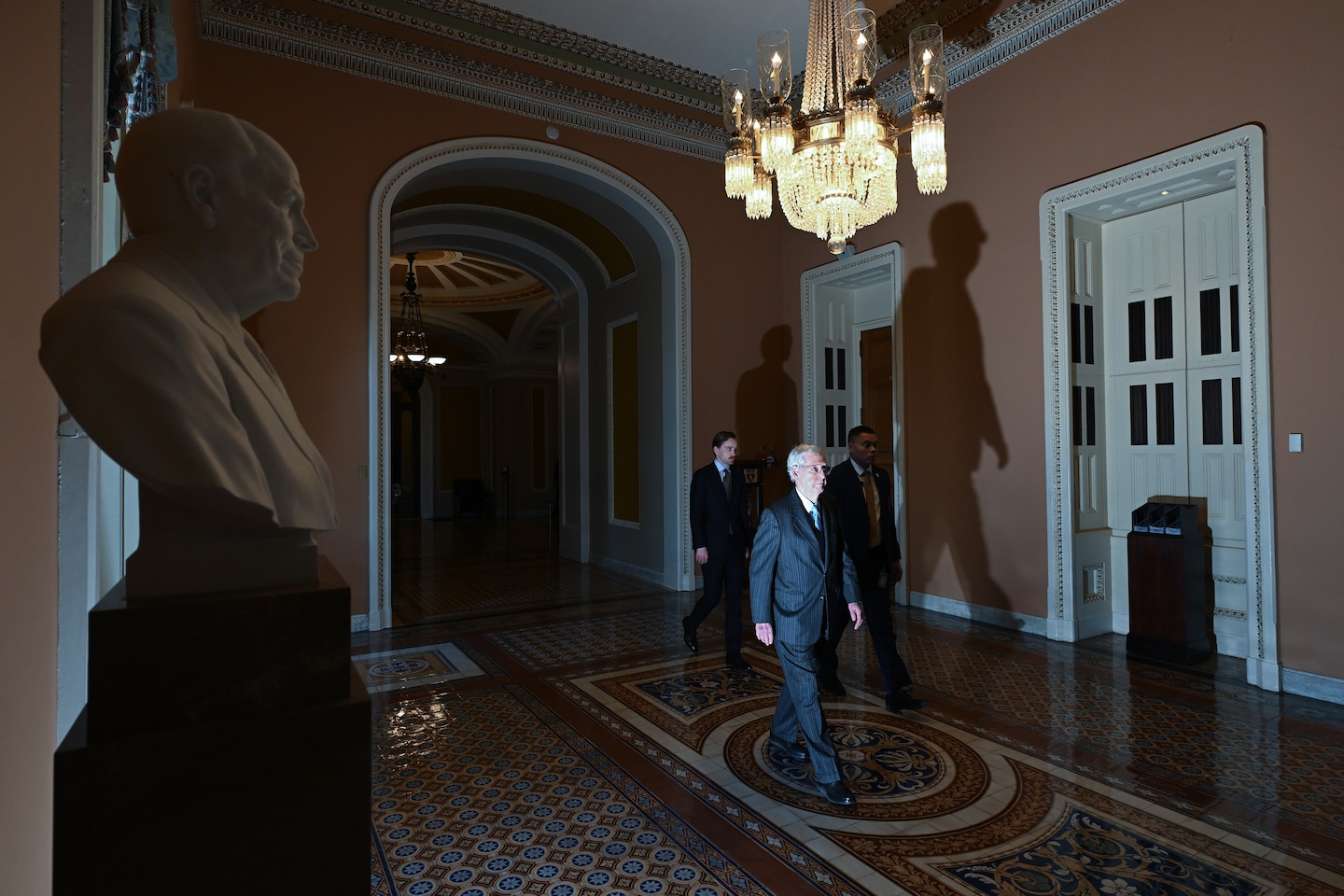
McConnell ‘willing to take the heat’ on Ukraine aid that divides the GOP
- Politics
- February 11, 2024
- No Comment
- 321
Senate Minority Leader Mitch McConnell (R-Ky.) defended the bipartisan border deal as the toughest reform package Democrats would ever sign off on in the meeting.
But just two weeks later, McConnell joined almost every other Republican in voting to block the plan he helped craft — bending to the political reality shaped by former president Donald Trump’s opposition to the package that could have significantly ameliorated one of President Biden’s top political weaknesses.
The moment was a political blow for McConnell and revealed his shaky hold on a conference that increasingly takes its cues from Trump — whom McConnell has not spoken to since two weeks before the Jan. 6, 2021 attack on the U.S. Capitol. It also reflected the massive amounts of political capital the 81-year-old McConnell has spent over the past year pursuing a priority that once would be Republican orthodoxy — aiding a European ally fending off a Russian invasion.
On Thursday, McConnell and 16 members of his conference voted to move forward on a national security package, which would send $60 billion to Ukraine and $14 billion to Israel, stripped of the controversial border restructuring. The legislation appears on track to pass this week, though its fate in the GOP-controlled House is still uncertain.
It was a moment McConnell had been working toward for six months, as he found himself out of step with a conference that continually resisted his efforts to fund Ukraine and constantly shifting the goal posts of what would get them there.
“First they wanted to do it and then they didn’t want to do it and then they’re not sure,” McConnell said in an interview with The Washington Post on Friday, referring to many Republican senators’ ever-shifting positions on the border deal. In the end, they “couldn’t seem to make a law,” he conceded. “Sometimes that happens.”
Many Republican senators are less philosophical about the episode, with a handful of them even calling for McConnell to step aside. Weeks of bruising and vituperative meetings where lawmakers have yelled at each other about the divisive politics of helping Ukraine have taken a toll on morale. And the episode underscored the difficulty McConnell faces leading Republicans while having no relationship with their likely presidential nominee, who swiftly killed the plan they had worked toward.
“Look, I felt it was important and I spent an enormous [amount of] time talking about this trying to convince supporters to support it,” said McConnell. “On this one, I’m motivated more by what’s the right thing for America and I’m willing to take the heat.”
McConnell, who is the longest-serving leader in Senate history, describes himself as a “longtime observer and foe” of Russia and prides himself on being involved in efforts to expand the NATO alliance to protect former Soviet Union countries from any expansionist aspirations on the part of Vladimir Putin.
But he also realizes that many Republican base voters — and lawmakers — do not see the world the same way he does. An “America First” view of the world spearheaded by Trump has overtaken the Ronald Reagan “Peace through Strength” mantra that McConnell believes in.
“Clearly there is more objection to foreign involvement in the Senate now than there used to be,” McConnell said. “Usually we just had Rand Paul and Mike Lee and now I think it’s a bigger group. And in their defense they just see it differently. They don’t think America being involved around the world is a good idea. And so I respect their judgment, I just don’t agree with it.”
McConnell blames former Fox News host Tucker Carlson, who recently published a lengthy interview with Putin, for stoking the anti-Ukraine movement in the United States.
“He developed a following who in our party have become pretty vocal,” McConnell said of Carlson. “So you got two choices when that occurs: You can either give into it or stand up and say why that’s a mistake.”
Sen. Tommy Tuberville (R-Ala.) cited Carlson’s interview in a tweet blaming “DC warmongers” instead of Putin for “prolonging the war.”
That determination to fight against GOP skepticism on Ukraine led him to pursue an issue that deeply divided his conference, which is unusual for a man who’s often accused of being more focused on winning elections and the Senate majority than on policy.
“My experience with Mitch McConnell is he picks his battles,” said retired senator Patrick J. Toomey, a McConnell ally when he was in the chamber. “He feels very strongly he’d be … doing everything he can to support Ukraine under any political circumstances because he feels that strongly about it.” A vacuum had also opened up in the chamber with the 2018 death of Sen. John McCain (R-Ariz.), the loudest pro-NATO and hawkish voice among Republicans.
McConnell was first at odds with his conference on the matter in September. He tried to rally Republicans around passing a temporary funding bill to keep the government open that would include $6 billion in Ukraine funding, a move that would put the Republican-led House weary of Ukraine aid in a bind. Senators preferred waiting to pass the version of the bill sent over by the House, which did not contain the aid. Sen. John Thune (R-S.D.), his deputy and an aspirant for his job whenever McConnell steps aside, and Sen. Lindsey Graham (R-S.C.), who maintains close ties with Trump, told McConnell that the conference would not back repeated funding allotments for Ukraine. (In short order, the White House, House and Senate were all on the same page: Drop the Ukraine funding to keep the government open.)
McConnell walked out of that internal conference meeting where the decision was made, alone, and announced Senate Republicans’ intentions.
“I’m confident the Senate will pass further urgent assistance to Ukraine later this year,” McConnell said in a floor speech then.
As the White House prepared its ask for $60 billion in Ukraine aid in October, McConnell was clear with the Biden administration, including in a meeting with Secretary of State Antony Blinken: It must include border funding. The next day, Biden released a $106 billion supplemental request for Israel, Ukraine and Taiwan that also included $14 billion for border security.
But the conference had already started to shift underneath McConnell yet again. It wasn’t just money for the border, it was changes to border policy Republicans now demanded to accept Ukraine aid. Newly-elected House Speaker Mike Johnson (R-La.) — an unknown quantity trying to meet the demands of his unruly conference — told Senate Republicans that he supported aid to Ukraine but it must be paired with a House-passed aggressive border security bill known as H.R. 2 or something similar.
In a meeting with his leadership team the day before Halloween, McConnell was told by his top deputies that he didn’t have the votes to pass Ukraine aid, according to several people familiar with the meeting who spoke on the condition of anonymity to discuss it. A growing number of senators are aligned with the more Trump-aligned House — and not McConnell. And the base of the party was so fired up about the border, his leadership team insisted, they wouldn’t be able to find enough Republican senators to pass a Ukraine package without also producing something that could address the border crisis.
McConnell, who had already started to discuss the need for the package to do more on the border, had no choice. He didn’t have the votes. He acquiesced and decided that Ukraine aid would need to be paired with tough border restructuring. He tapped Graham and Sen. James Lankford (R-Okla.), a conservative ordained minister who had just won reelection, to lead the border negotiations effort that also included Sens. Kyrsten Sinema (I-Ariz.) and Chris Murphy (D-Conn.).
“He’s read the room,” one senator said at the time.
There’s a crowded graveyard of failed immigration restructuring efforts in the Senate dating back three decades now, and some of McConnell’s critics have said that agreeing to pursue this plan led them into a political trap, with Democrats claiming the mantle of border security after Republican support for the plan predictably collapsed. And some who knew McConnell’s political instincts doubted that he didn’t realize from the beginning that Republicans would have to reject a border deal in an election year. But because his conference demanded it, McConnell moved forward anyway.
“Our members insisted on it,” McConnell said. “And frankly it’s pretty hard to argue it wasn’t an important problem and the administration in the supplemental actually asked for [border] funds.”
“And the only issue was, could we all figure out together — because it’s a Democratic president and a Democratic Senate — [how] to get it done?” he added. “And it in the end proved impossible.”
Border deal negotiations appeared on the brink of collapse in December, when Biden invited Ukrainian President Volodymyr Zelensky to Washington in an attempt to shame Republicans into mustering the political will to fund the war.
At this low point, the White House finally became intimately involved in the talks and negotiations took on a new life. Homeland Security Secretary Alejandro Mayorkas, who was steeped in the challenges at the border as he faced record-breaking crossings, came to the table with a host of novel ideas to retool the asylum process. Lankford, Sinema, Murphy and top staffers for Majority Leader Charles E. Schumer, McConnell all doubled down. Graham’s staff also joined the talks around then.
But as the complicated negotiations on arguably one of the most difficult issues in American politics dragged on and the calendar turned from 2023 to an election year where presidential primaries were underway, a hostile political environment became more difficult to overcome.
Lankford, with McConnell’s staff at the table, kept trying to meet the demands of their party while negotiating with Democrats, who showed a surprising willingness to crack down on the border. Lankford insisted the bill give the president the authority to close the border to migrants because he believed it could help win over speaker Johnson. They delayed the release of the bill text to get buy-in from Graham by further rolling back the president’s ability to let in migrants through a parole program by applying it to the northern border too. But even as they bent over backward to meet the GOP conference’s stringent demands, Trump and right-wing media figures pulled the rug out from under them.
On Jan. 17, Trump posted on his social media site that senators should not strike a border deal unless it was “PERFECT.” The next week, Fox News began inaccurately characterizing the plan as allowing more illegal immigration than under current law and Trump’s attacks grew more pointed.
The fracas led to some senators attacking each other in contentious meeting after contentious meeting over the past few weeks. The vitriol was so bad in one recent meeting that Sen. Susan Collins (R-Maine) implored her colleagues to stop “vilifying” each other, according to one person present. McConnell was often a silent presence in the room. Some senators wondered whether he was even able to closely follow the back-and-forth given his poor hearing.
McConnell called them “robust discussions” in the understatement of the year. “For some of our members I think President Trump indicating he’d rather we not pass something had some influence,” he said. But he disagreed with the notion that he could have helped prevent that conflict if he had a relationship with Trump, saying it was clear the former president had strong feelings about the matter.
Soon after the group released the text of the bill, Johnson declared it dead and Republican senators began defecting en masse. Lankford, Sinema and Murphy, who had given up months of their lives to produce the bill endorsed by the conservative Border Patrol Council, excoriated those who had defected from the bill simply because Trump opposed it.
Murphy said there is “nobody in charge” of the Republican conference, and Democrats openly asked who would trust McConnell to be on the other side of a deal in the future. It also emboldened a group of about a dozen critics on the right flank of the conference, whose critiques grew louder and more pointed.
“I think that it’s definitely very chaotic in the sense that it’s not totally clear who’s calling the shots in the Republican conference right now,” Sen. J.D. Vance (R-Ohio) said.
Sen. Josh Hawley (R-Mo.) accused him of not talking to his members and leading the conference into a “disaster.”
“He’s so focused on Zelensky,” Hawley said. “He’s got bigger problems than Zelensky.”
McConnell has brushed off the criticism, saying he’s always had a group of about 10 critics who had their chance to get rid of him in 2022 when he defeated Sen. Rick Scott (R-Fla.) for leader. “I don’t expect to have no critics,” he said. “I’m pretty good at taking a punch.”
McConnell’s allies point out that the senators who are the most angry at McConnell are also the ones who most loudly demanded a border component be attached to Ukraine funding in the first place.
“Mitch McConnell can only lead the people that want to be led,” said Sen. Kevin Cramer (R-N.D.).
And it’s possible that McConnell — who has not said if he would run for leader again and who has battled health problems over the last year — is thinking of his legacy and the history books in this particular conflict. He’s pointed out that much of the Ukraine military support funds were actually spent in the United States to replenish military stockpiles after the administration transferred older weaponry and materials to Ukraine — an effort to chip away at “America First” skepticism of the effort.
“I think his legacy one way or the other is he put his prestige and his time and his effort and his floor speeches to work toward the benefit of Ukraine,” said former senator Rob Portman of Ohio, who believes Congress will eventually provide more funding for its ally. “I think his legacy would be that he fought hard.”
McConnell, fresh off the recruiting victory of helping convince popular former GOP governor Larry Hogan to run for Senate in Maryland on Friday, said he does not think the episode will harm Republicans’ chances of taking back the Senate majority, naming his top targets as West Virginia, Ohio, Montana and Pennsylvania.
And though McConnell has dedicated countless floor speeches to arguing his view of the world — that Iran, Russia and China must be countered by American strength — he says he does not mind that the new crop of Republicans running to be in the Senate will all likely oppose the Ukraine funding bill on the trail.
“Look, we’ve got a conference from Lisa Murkowski to Ron Johnson,” he said, contrasting the moderate Alaskan with the firebrand who just won reelection in Wisconsin. “The most important number is 51. I’ve never tried to broker what kind of Republican. What I always am interested in is: Can they win?”
#McConnell #heat #Ukraine #aid #divides #GOP









